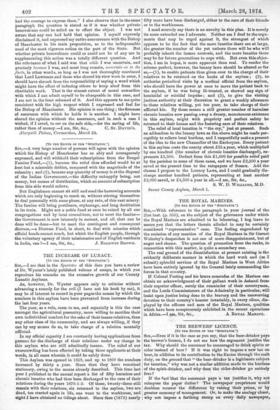THE INCREASE OF LUNACY.
[TO THE EDITOR OF THE "SPECTATOR.") see that in the Spectato of this date you have a review of Dr. Wynter's lately published volume of essays, in which you reproduce his remarks on the excessive growth of our County Lunatic Asylums.
As, however, Dr. Wynter appears only to criticise without advancing a remedy for the evil (I have not his book by me), it may be of interest to record in your pages the means by which the numbers in this asylum have been prevented from increase during the last four years.
The poor, as a rule, seem to me, and especially is this the case amongst the agricultural peasantry, more willing to sacrifice their own indivividual comfort for the sake of their insane relatives, than any other class of the community, and are always willing, if they can by any means do so, to take charge of a relation mentally afflicted.
In my official capacity I am constantly having applications from persons for the discharge of their relations under my charge in this asylum who are still admittedly insane. The relief of our overcrowding has been effected by taking these applicants at their words, in all cases wherein it could be safely done.
This Asylum was opened in 1859, and up to 1869 the numbers increased by thirty a year. Since then they have remained stationary, owing to the means already described. This time last year I published in the annual report a list of fifty harmless and chronic lunatics who had thus been discharged to the care of their relations during the years 1870-1-2. Of these, twenty-three still remain with their relations, six returned to the asylum, two are dead, ten started again in life, one went to the workhouse, and eight I have obtained no tidings about. Since then (1872) nearly fifty more have been discharged, either to the care of their friendsP or to the workhouses.
I need scarcely say there is no novelty in this plan. It is merely its more extended use I advocate. Neither am I deaf to the argu- ments that may be urged against it, the strongest of which appears to be the fact that the more lunatics there are at large, the greater the number of the yet unborn there will be who wilt probably inherit the insane neurosis, and the more lunatics there may be for future generations to cope with. But even this objec- tion, I am in hopes, is more apparent than real. To render the scheme perfect, however, the lunacy laws should be altered so far as,—(1), to enable patients thus given over to the charge of their relatives to be retained on the books of the asylum ; (2), to authorise periodical visits by a medical official from the asylum, who should have the power at once to move the patient back to the asylum, if he was being ill-treated, or showed any sign of homicidal or suicidal impulse ; and (3), to give the visiting justices authority at their discretion to grant a weekly allowance to those relatives willing, yet too poor, to take charge of their afflicted kin. By these means a still greater number of harmless chronic lunatics now passing away a dreary, monotonous existence- in this asylum, might with propriety and perfect safety be returned to their homes and the fostering care of their relatives.
The relief of local taxation is "the cry," just at present. Such an addendum to the lunacy laws as the above might be made per- ceptibly to relieve local burdens, and I respectfully make a present of the idea to the new Chancellor of the Exchequer. Every patient inthis asylum costs the county about £35 a year, which multiplied by one hundred (the number of chronic lunatics discharged), re- presents £3,500. Deduct from this £1,000 for possible relief paid by the parishes to some of these cases, and we have £2,500 a year- saved at the present time to the ratepayers of Sussex. Add the- clauses I propose to the Lunacy Laws, and I could gradually dis- charge another hundred patients, representing at least another £2,000 saved, or £4,500 a year in all.—I am, Sir, &c.,


































 Previous page
Previous page